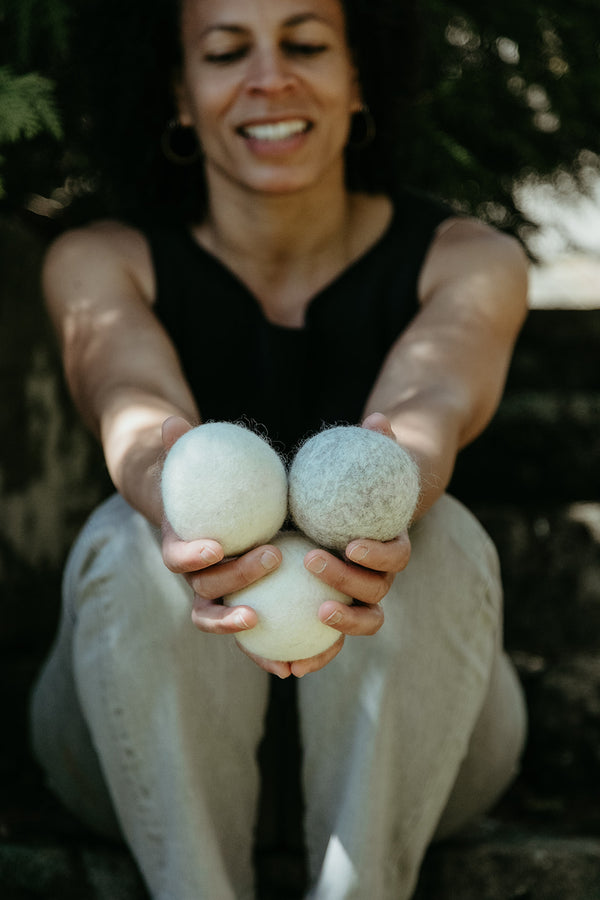Your Cart is Empty
Pick Your Perfect Pack
Pick Your Perfect Pack
Do Dryer Balls Really Work?
January 16, 2023 3 min read

Environmentally friendly. All-natural. Sustainable. Many of today’s consumer products boast healthy benefits, but some wonder about the effectiveness of these options.
When it comes to dryer balls, an increasingly popular alternative to dryer sheets, there’s plenty on the market that reduce harmful chemicals in our homes and environment. To make the switch in your home, consider the following:
Are Dryer Sheets Really Toxic?
Fabric softener sheets often contain harmful chemicals that are released when heated to create formaldehyde, which health experts say is a human carcinogen. Yes, they make our linens smell fresh and feel soft. But the chemicals are designed to stay in your clothes and slowly release over a long period of time, which means they absorb into your skin and are continually inhaled into your lungs. This exposure can lead to health issues linked to respiratory problems, skin and eye irritations and even cancer.
The thin dryer sheets are typically polyester or cellulose fabric coated with liquid softeners and fragrances. Once the dryer is turned on, the heat melts the elements, which are released onto laundry. While experts say that not all chemicals are a problem, the jury is still out on the toxicity of the fragrances.
Dryer Sheets vs. Wool Balls: Which are Better on the Environment?
Hands down, wool dryer balls tread lighter on the environment. It takes years for fabric softener sheets to break down in landfills while 100 percent wool balls are generally biodegradable and reusable.
Are Wool Dryer Balls Effective?
Test after test say yes! By adding three wool dryer balls to a load, fabrics are separated during the process, allowing for a better heat flow. Laundry is naturally softened and fluffed while static cling and wrinkles are eliminated. The process can reduce dryer time up to 25 percent, which conserves energy and cuts down utility bills.
Are all Dryer Balls the Same?
No, dryer balls come in plastic and wool. While the plastic—typically thermoplastic—is durable, you won’t find these balls softening fabrics. Polylactic Acid thermoplastic is biodegradable; polypropylene is not.
Compared to plastic, wool lasts longer and is more effective when using essential oils to scent your laundry. Wool also absorbs moisture, which helps reduce static and is a natural material compared to plastic.But remember: A loosely woven wool ball will result in a shorter lifespan.
How Long do Dryer Balls Last?
While it depends on your number of laundry cycles, a well-made dryer ball lasts about a thousand washes, which equals a one- to three-year lifespan. Conversely, the average laundry load calls for one to two sheets per load so the typical home that does two loads a week goes through about 104 dryer sheets a year versus the same three dryer balls for the same duration.
Does Cost Matter?
Just like anything else, you get what you pay for. While you can shop around and find a trio of dryer balls for $10, more effective brands will set you back $30 to $35 for a three-pack.
Why Choose LooHoo?
LooHoo was among the first to introduce wool dryer balls to the market. The Maine-based company is also one of the very few “Made in the USA” products.
Proprietress Cyndi Prince is dedicated to sustainable living and reducing harmful chemicals in our homes and environment, so packaging and shipping materials are plastic free and primarily made with recycled materials.
LooHoo also supports American Sheep Farms and the U.S. Farming Industry by sourcing domestic wool from cruelty-free farms that have strict policies that promote animal welfare standards and farmers who use best management practices established by the USDA. Processed in a historic wool mill in Cyndi’s home state of Maine, LooHoo Wool Dryer Balls are so durable they last thousands of loads.
Subscribe
Sign up to get the latest on sales, new releases and more …

Join the LooHoo Community
Sign Up Now to be the first to learn about new products, sales and giveaways.

